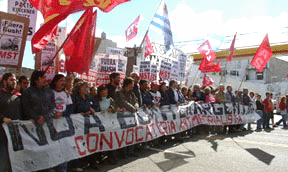
Archives


The NRA Comes to the Rescue (of the Firearms Industry)
Bravo, National Rifle Association! On October 20, 2005, Congress caved to the organization's relentless pressure and voted to pass the "Protection of Lawful Commerce in Arms Act" - a piece of lobbying, er, legislation designed to shield firearms manufacturers and dealers from liability lawsuits stemming from the use of their weapons in crimes. On October 26, President Bush signed the bill into law. In the words of NRA Executive Vice President Wayne LaPierre, "freedom, truth, and justice prevailed" with the passage of the bill; the NRA "scored "an historic victory," "protected the sanctity of the Second Amendment," and "saved the American firearms industry," which, goodness knows, is right up there with children and whales as a worthwhile cause. "Save the guns;" now there's a slogan.

Cold Reception for ‘Fortunate Son’ at Trade Summit
Thousands gathered at the Summit of the Americas in Mar del Plata, Argentina on November 4th to protest the presence of George W. Bush and his free trade agenda. Activists, along with Venezuelan President Hugo Chavez, vociferously rejected any U.S. free trade plans for the region as they believed such policies facilitate corporate exploitation. As an alternative, they advocated for a people-oriented trade block among progressive Latin American governments.
"The Free Trade Area of the Americas (FTAA) doesn´t seem like something that will help Argentina," explained 62 year old Betti Cruz, a member of the leftist Peronist political party, Barrios del Pie. "I run a food kitchen and see everyday how these policies of free trade are hurting the poor more and more."

Social Change Today: An Interview with Noam Chomsky
Steven Durel: Professor Chomsky, for forty years now you have been a leading voice in political action and social justice. After this near half-century of participation in the libertarian movement, how have things changed?
Noam Chomsky: Change is never linear. It goes forward in some respects, backwards in others. Just to take the positive side, there has been a very substantial increase in the general level of civilization of society, and we see that in dimension after dimension. Concern for human rights has increased enormously and has many components. Women's rights, for example, are protected way beyond what was true forty years ago. Minority rights are far more protected, though there is plenty distance to go.

The School of the Americas: More than “A Few Bad Apples”
In response to overwhelming evidence that the US Army School of the Americas has trained Latin American military personnel in civilian-targeted terrorism, representatives of the school have come up with numerous creative excuses and denials. Perhaps the most commonly used argument is that the hundreds of SOA graduates who have become dictators and gross human rights violators are only "a few bad apples" out of the thousands who have graduated from the school. A brief overview of the involvement of SOA graduates in the most brutal period of Guatemala's counterinsurgency war shows that they were more than a few bad apples. As is the case in most Latin American countries which have terrorized their civilian populations, the intellectual authors of systematic repression and the most brutal terrorists are graduates of the SOA.

An Unreasonable Woman
But what about ordinary folks who do something extra-ordinary? Those who get out of bed in the morning and go to work, while simultaneously managing to raise children, those who discover that the world doesn't look quite right from the front porch or the wooden comfort of the Adirondack chair?
